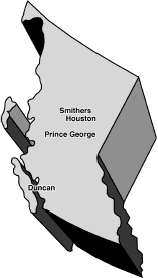New Research: Dancing in the Darkby Pat Campbell In 2001, a research team consisting of four practitioners and a graduate student in British Columbia sought to answer an essential, yet simple question:
The researchers also explored how literacy practitioners engage in collaborative research. Due to space constraints, this article does not focus on their findings with respect to the second question. Dancing in the Dark, a noteworthy research study, explores this question and documents the issues and struggles that the researchers encountered during the dance. Kate Nonsuch, Paula Davies, Darcy Allen and Dee McRae conducted and taped individual and group interviews with twenty-five adults. These participants were aged nineteen or older, had less than a Grade 12 education or a modified Grade 12, and were not currently participating in a learning program. The purpose of the interviews was to identify ways in which adults with little formal education learn. Questions such as “How do you find out information about a disease?” were used to gain insight into how the adults learned. The researchers wanted to use these findings to generate new ideas about how society can support adults with little formal education.
The research team identified four key themes that emerged from their data: learning strategies, life experiences, agency, and emotions. Although these four themes are presented as separate entities, they form a gestalt and are interconnected. The research findings pertaining to learning strategies are briefly described below. The adults with little formal education named five learning strategies that they use to acquire both new skills and knowledge: Ask, Read, Observe/Model, Just Do It, and Use Technology. In choosing a strategy, participants considered “what they were learning, their skill level, their overall comfort with a strategy and their previous success with a particular strategy” (Niks et al p. 31). Among the participants, the asking strategy was the most frequently cited learning strategy. However, the researchers found that some participants, particularly those with low agency, would sometimes be too scared, embarrassed, or shy to ask others for help.
During the interviews, the researchers observed that the participants tended to use stories or life experiences to describe their learning strategies. As the study progressed, the researcher team realized the importance and significance of these stories. In my opinion, the team’s realization has important methodological implications for researchers who use interviews as a form of data collection. Perhaps adult literacy practitioners and academics can begin integrating storytelling into the traditional interview process, which usually consists of a questions and answer format. While reading Dancing in the Dark, I was particularly intrigued by the researchers’ struggle and frustration with the literature review process. Since their research question was part of an emerging discourse, there was a lack of literature on the research question and the four key themes that emerged from the data. Perhaps we need to use a wide angle lens as we approach the literature review. Rather than focusing on topics pertaining to the research question and findings, we could read a body of literature that would help us to interpret the findings. As a case in point, the findings from this research suggested that some participants would sometimes be shy to ask others for help. If this finding is filtered through feminist literature, we learn that hooks (1988) views shyness as a socially constructed phenomenon. hooks asks the question: “Can their fear be understood solely as shyness or is it an expression of deeply embedded, socially constructed restrictions against speech in a culture of domination, a fear of owning one’s words, of taking a stand?” (hooks p. 17). This example illustrates how feminist literature can alter our perceptions; in this case, shyness was placed within the larger sphere of social relations. The research team also questioned and reflected upon the purpose, value, and role of a literature review from the perspective of both academics and practitioners. The Dancing in the Dark research team proposed that “practitioner conversations, which are based on their shared experience in the classroom, serve some of the same functions as a literature review” (Niks et al p. 4). The research team’s struggle with the literature review process raises important questions for the field of adult literacy. Do academic researchers ground their research and knowledge in literature whereas practitioner researchers ground their research and knowledge in their experiences? Given their limited resources in terms of time and funding, should practitioners channel their energy into a literature review? Would the dance be more vibrant if academics and practitioners engaged in praxis, a cyclical process of learning that unifies theory and practice?
|
 How do adults with little formal
education learn?
How do adults with little formal
education learn?
